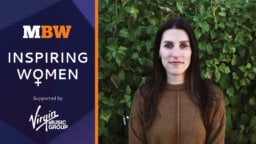MBW’s Inspiring Women series profiles female executives who have risen through the ranks of the business, highlighting their career journey – from their professional breakthrough to the senior responsibilities they now fulfill. Inspiring Women is supported by Ingrooves Music Group.
Late last year, Sarah Lockhart was named Head of A&R for what is now Sony Music Publishing in the UK.
The promotion arrived amidst a raft of changes at the company – including the beginning of Jon Platt’s tenure as global Chairman and CEO, a re-brand from Sony/ATV, and other promotions and shifts in the UK team, including David Ventura and Tim Major being named co-Managing Directors in 2019.
This new era at the company holds a wealth of promise, says Lockhart – and she’s determined to make her mark.
“I like the idea that this is going to be a famed tenure, not because of me, but because of the work that comes out of this time,” she explains.
“I’d like to be able to look back and determine that what went down during this period paved the way for X, Y and Z. I like the idea of making change, not just using this time to continue what’s been happening – to look under the bonnet, question things and figure out why are we doing things a certain way, which might be part of a bygone era of working.”
Prior to joining Sony, Lockhart spent significant time in the underground music scene, working at radio station Rinse FM, (where she successfully campaigned for its radio licence), running independent record labels, and in vinyl distribution and record shops.
She also spent a five-year stint at EMI Music Publishing in the early ‘00s, which was her first venture into publishing.
After leaving school at 15 (she wasn’t great at following the rules, she says), and raving her way through the rest of her teens, Lockhart eventually recognised that she might be able to turn her passion for music into a job.
“When I was about 20, I realised that I’m more knowledgeable about the music that I’m consuming and experiencing than anyone else I know. I recognised that maybe that was telling me that this is an area that I would be good at for a career.”
Sarah Lockhart
“When I was about 20, I realised that I’m more knowledgeable about the music that I’m consuming and experiencing than anyone else I know. I recognised that maybe that was telling me that this is an area that I would be good at for a career.”
After getting some advice from a contact who worked in music, Lockhart started distributing vinyl to record shops, while also running her own parties as a promoter. She eventually caught the attention of Guy Moot, who offered her a job at EMI. “He recognised that I was the person that was deciding the vinyl to buy to sell to the shops and those choices were becoming chart successes, like a year and a half later,” Lockhart remembers.
Under Lockhart’s watch, the Sony Music Publishing UK team has signed Young T and Bugsey, Beabadoobee, BBC Music’s Sound of 2021 winner Pa Salieu, London rapper Digga D, Aitch, D-Block Europe, and many more.
Here, we chat to her about what she looks for in new signings, biggest lessons learned across her career, what Sony’s new era under Jon Platt might look like, and the advice she’d offer to a younger version of herself.
What are the biggest lessons that you’ve learned across your career, and how does your diverse experience have an impact on how you operate today?
Broadly speaking, I think that creativity and talent doesn’t discriminate where it’s coming from and that makes me very open-minded. I’ve always been very interested in what’s next. That’s part of what A&R is, to make sure you’re on trends, but I’ve realised as I’ve got older that I’ve been at the forefront of lots of movements, and cultural and music changes. With underground, if you can call it that anymore, or subculture, it’s more innovative, more risk gets taken because the stakes are not so high.
As you go into the corporate or commercial mainstream structures, the commerce and business side of it can create fear of change and less risk taking. But the biggest learning for me is the [importance of] risk taking and the innovation that comes out of that.
“The underground movement is always moving, it’s led by the creatives and that burning desire to create, and you can’t control that, the current is always moving.”
The underground movement is always moving, it’s led by the creatives and that burning desire to create, and you can’t control that, the current is always moving. The mainstream tries to almost capitalise when there’s a big wave or a big peak and then it tends to want to stay there and try to maintain it for as long as possible, but the underground just keeps on going. I like to be connected to both.
When I worked for EMI Publishing in the late ‘90s as an A&R Manager, I had one foot in the underground. I realised there’s this lack of understanding between underground music businesses and mainstream music businesses. They spend so much time talking about why they are each the best; there is not enough collaboration, and they’re ignorant of each other.
Because I’ve run my own independent businesses, worked in underground culture and worked with subcultures and small communities, and I’ve worked in the corporate mainstream, I can see both sides. So I feel a bit like a bridge. And when you can blend both, with each side helping each other, it’s amazing. With the DIY movement and people wanting to retain their rights, it isn’t the norm that you would automatically, at a certain level of success, need to engage with a corporate company like a major label or publisher, so that relationship needs to really be harmonious and beneficial.
Where does the role of a publisher sit in this new world of DIY artists?
If anything, now is a time where the expertise of a publisher is needed more than ever. I’ve got lots of writers who own their masters and are managed by people they came up with, and to plug in with our expertise is creating lots and lots of value and empowering them with knowledge that they didn’t have otherwise.
“When I decided to get back into music publishing, the most exciting thing was to be able to really empower songwriters, on any level, from any community, and know that if they plug in, we will be able to add value.”
When I decided to get back into music publishing, the most exciting thing was to be able to really empower songwriters, on any level, from any community, and know that if they plug in, we will be able to add value. That gives me purpose and is why I’m enjoying this role.
You joined Sony Music Publishing around the same time as Jon Platt took the helm as CEO. What impact is his leadership having on the UK division?
He’s an A&R. The fact that a global CEO of a music company like Sony is being led by somebody that’s worked first-hand with creatives creates this leadership that is authentic to what’s happening on the ground. There isn’t this disconnect that I have often seen with corporate leadership. The fact that he’s a music person means it’s all about the songwriter and the power of songwriting for connection – that’s his message and it’s solidified what we do as individuals. It feels really authentic.
You’ve signed some really interesting and successful writers so far. What is it that you’re looking for when you’re making those signing decisions?
There’s an energy around it – you can tell when somebody is creating something that is unique. I’m always looking for someone who, until they came along, you didn’t realise that’s what was missing in the market. I tend to really like people that are setting trends, spearheading movements or sounds.
On an instinctive level, it’s crucial to just trust your gut. You don’t always get it right, we’re in the biggest risk-taking business I’ve ever come across and it’s just not possible that we’re going to get it right every time. But we try our best, we use our instincts and our experience.
There’s more visibility in data, charts, streaming and TikTok but what I’ve learned – and what I try and instil in A&Rs – is that you can’t take away the fact that I love this thing. You can tell me why it might not work commercially, but you have to be unwavering in what you love and what you don’t love.
I’ve got enough experience now to recognise the feeling that I get when my instinct is telling me something even though the data may tell me something different, or I might be getting a lot of pushback. Following my instinct has served me well. The more you rely on your instinct, the more you learn to understand it. That’s what sets aside a really good A&R – they’ve got an instinct and they’ll take a risk on that instinct.
What about your approach to writer development?
Once you’ve signed someone, have you learned anything about that process in particular over the years that you always remember today? Try to figure out what you could do that would be game-changing. Don’t spend your time being really busy trying to understand everything that they and their team are doing, and [answering] all your emails. I’m not going to be remembered for being really great at managing my inbox.
It’s about connecting to the creative vision of the writer but also trying to see where they are in their strategy, and figuring out what is the thing that you could do to actually make a difference to their career, and trying to put your energy into those things. The other thing is recognising when a writer is staying within their comfort zone and working very carefully to push their boundaries a little bit.
Over the course of an artist’s career, their comfort zone becomes wider and wider. It’s important to be supportive and recognise that – don’t just be a yes person. What I’ve observed is that when artists have gone a little bit outside their comfort zone, that’s when the audience broadens, success is bigger, or it creates their biggest hit.
One of the things that you’re tasked with now is to find innovative opportunities for songwriters globally. Where do you see those sorts of opportunities, now and in the future?
Well, working globally is an amazing facility. Through that, we’re finding new processes and ways of working so that we can tap into global audiences, networks and communities. Streaming is a global platform, and there are clearly global audiences today, even if that’s a niche audience that might be insignificant with regards to chart position, or radio airplay.
But all of these pockets around the world add up and create movements and audiences for artists who are collectively picking up audiences, fans and streams, globally.
“Working globally is an amazing facility. Through that, we’re finding new processes and ways of working so that we can tap into global audiences, networks and communities.”
I’m really interested in how to work out what those audiences are doing and being able to read that using data and analytics is really interesting. People internationally in our company will reach out to me and say, ‘I really love Digga D,’ whereas traditionally it would have been quite siloed and they may not be aware of that rapper without it being pitched and explained to them.
There wasn’t such cross-collaboration and communication between the various departments. That’s happening all the time now and the pandemic has pushed us even more into communicating globally. I think that there’s going to be a lot that comes from that.
What would you change about the music industry and why?
The fixed views – a lot of the opinions and views are so fixed. It feels very rigid to me but maybe that’s just me being a rebel! I would like the industry to be more open to change. The industry’s got huge lineage and important wisdom and knowledge in it, but I feel like there’s more potential if things are just ripped up and started again, with all of the knowledge that we have, just rewriting the processes and habitual kind of thinking.
Does that pertain to any particular areas of the business?
No, I think it’s quite a British thing as well – this bureaucracy and red tape around things. I don’t know if this is a fact, but if you look at technology and other creative industries, when I’ve dabbled in those areas, it seems like there’s a lot more focus on the future.
The music industry has obviously gone through lots of changes but I think there’s room for more exponential change if the thinking was open to it. Change is difficult – someone said to me once that at least 80% of everybody involved has to be up for it.
You can’t get everybody to want to change all at once and that’s the problem. What really inspires me about Sony, this role and where Sony’s at, is it is the change. It’s action-orientated, it’s solution driven and it’s forward-thinking. It’s like we know all this shit, we know what we’re going to do, so let’s do it. I think that’s really refreshing and unusual.
What advice would you offer to a younger version of yourself starting your career today?
To think big. I think that we create our own limitations, but I realised that the person who judged me the most was me. Maybe it’s an age thing, maybe it’s a reputation thing, but now I don’t have any expectation of myself, I just do my best. There’s definitely a thing with social media and A&R people kind of being famous, and not in a good way.
People working around music can get a bit caught up in the idea that they might have some sort of status and that isn’t a good thing. You should put the songwriter or the artists that you’re working with first and take risks – the quicker you can take lots of risks, the quicker you’ll get the winning one; you can’t win without betting.





